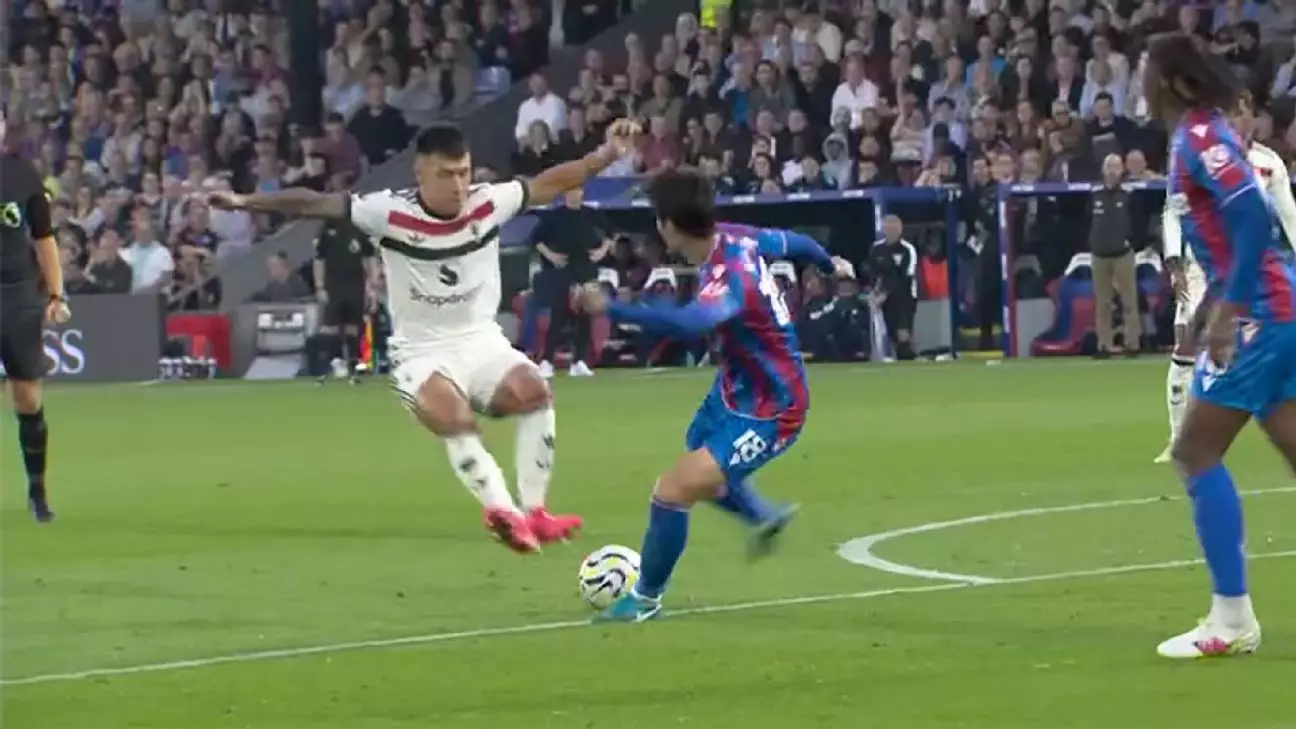The Premier League has long been a hotbed for controversy and debate, particularly regarding key match incidents (KMIs) that can significantly alter the course of a game. Recently, the Independent KMI Panel reached several decisions about contentious moments from the latest matchday that have stirred public interest and highlighted the complexities of officiating within the league. This critical review analyzes the incidents under scrutiny, the panel’s rationale, and what it reveals about the current state of officiating in English football.
One of the most-discussed incidents involved Manchester United defender Lisandro Martínez during a scoreless draw against Crystal Palace. Referee David Coote issued a yellow card for Martínez’s tackle on Daichi Kamada, which prompted a review by VAR official Chris Kavanagh. Although Martínez’s airborne tackle seemed to suggest potential recklessness, the VAR opted not to recommend further scrutiny, adhering to guidelines established by UEFA and the Premier League that mandate a yellow card if no contact is made.
The KMI Panel accepted this decision but conveyed mixed feelings about the nature of the challenge itself. Their review deemed the act “ridiculous” and underscored the potential danger posed by such reckless tackles on the pitch. The panel’s statement that Martínez was fortunate not to have contacted Kamada raises questions about the criteria for officiating decisions: while the lack of bodily contact justified the yellow card under existing guidelines, the sentiment implies a need for a reevaluation of criteria that distinguish reckless behavior from acceptable play.
Another prominent decision involved Arsenal’s Leandro Trossard, who received a second yellow card for delaying a restart during the match against Manchester City. The panel was mostly supportive of Michael Oliver’s decision, reflecting a keen consensus on maintaining the flow of the game. This incident demonstrated how seemingly trivial disruptions can culminate in significant consequences for players, adding a further level of scrutiny about how referees interpret and enforce rules pertaining to game management.
Interestingly, the panel’s unanimous sentiment did not extend to Nottingham Forest’s Morgan Gibbs-White, who received a second yellow card in a separate match against Brighton. The split vote indicated varying levels of tolerance among officials regarding what constitutes “reckless” versus “legal” challenges. As each game can be fraught with tension, it emphasizes the subjective nature of refereeing, which can lead to disparate interpretations of similar incidents.
Another controversial moment arose from West Ham United’s match against Chelsea when a penalty was denied for a perceived foul by Wesly Fofana on Crysencio Summerville. The KMI Panel’s vote ultimately determined that a penalty should have been awarded; however, they found it did not meet the threshold for VAR intervention. This highlights a notable inconsistency in the application of VAR, suggesting that while technology aims to correct clear errors, it may also suffer from rigidity that prevents potential injustices from being addressed.
Particularly noteworthy is the growing frustration among fans, players, and managers concerning the role of subjective judgment in officiating. As the panel acknowledged, Fofana’s hold on Summerville impacted the forward’s ability to progress toward the ball—a key factor that many argue should compel a stricter enforcement of the rules. The ongoing discourse about VAR’s limitations and its incorporation into the officiating process indicates a pressing need for greater clarity and more stringent criteria.
Upon evaluating the overall efficacy of VAR this season, the KMI Panel has reported fewer errors compared to last season. However, the minutiae of decisions still raise important questions about the efficacy and clarity of officiating in the Premier League. Mismatches in interpretations of fouls, combined with the potential for inconsistent application of penalties, remain sources of frustration for many stakeholders in the sport.
The panel’s acknowledgment of certain “wrong” on-field decisions—while unclear in classification for VAR intervention—suggests a deficit in the communication and understanding of what constitutes a clear error. The expectations for transparency and accountability grow with each season, highlighting that despite technological advancements, the human element of officiating—along with its inherent subjectivity—remains pivotal.
As the Premier League moves forward, the interplay between rules, interpretations, and technology will need continuous reevaluation. Recent key match incidents demonstrate that while the independent KMI Panel serves as an essential conduit for assessing officiating decisions, the established guidelines and their interpretations may not always align with the spirit of the game. Advancements in officiating require flexibility and an increasingly nuanced understanding of current dynamics to ensure that the integrity of the sport remains intact. A strong and unified approach to these issues will be vital for fostering confidence within the league among players, fans, and officials alike.

